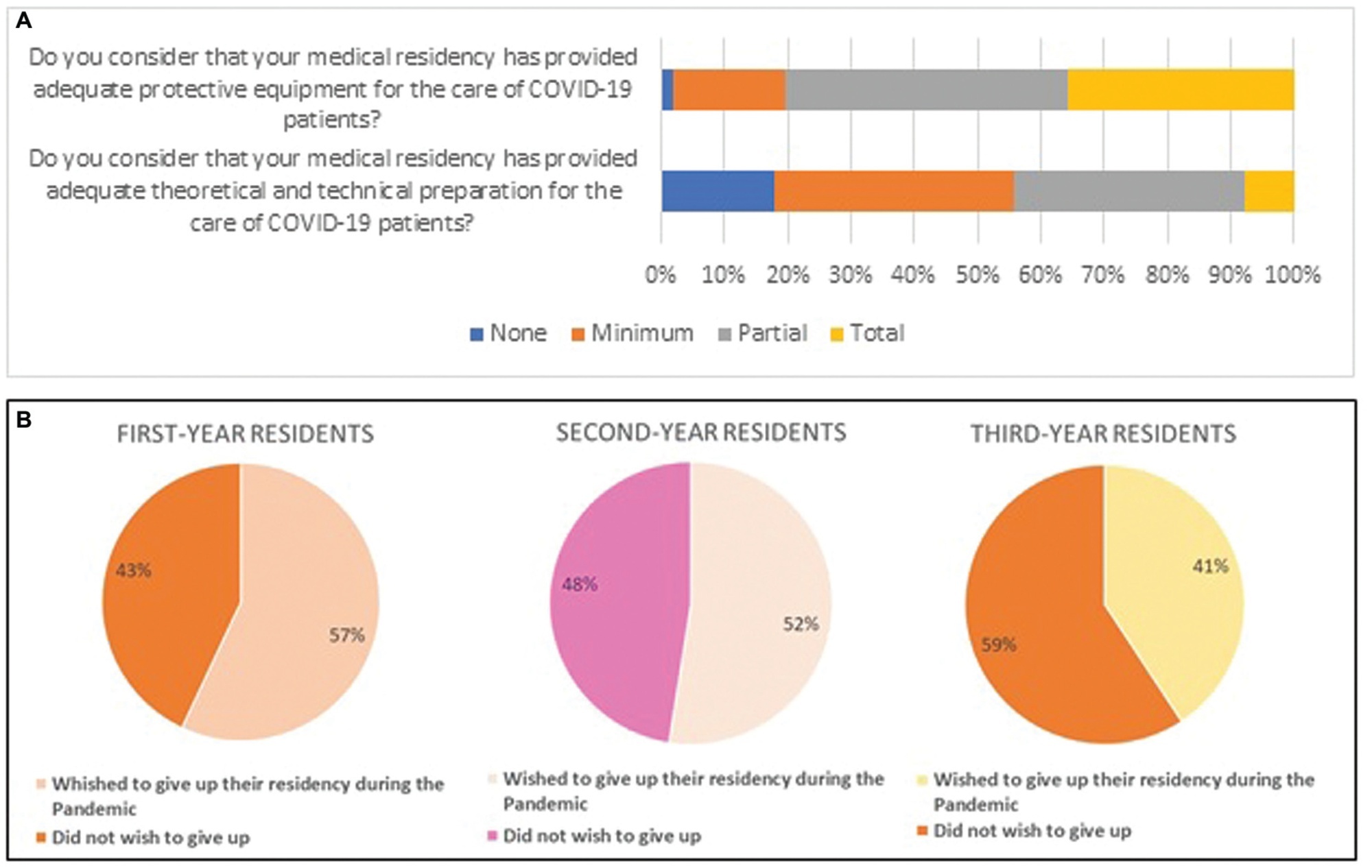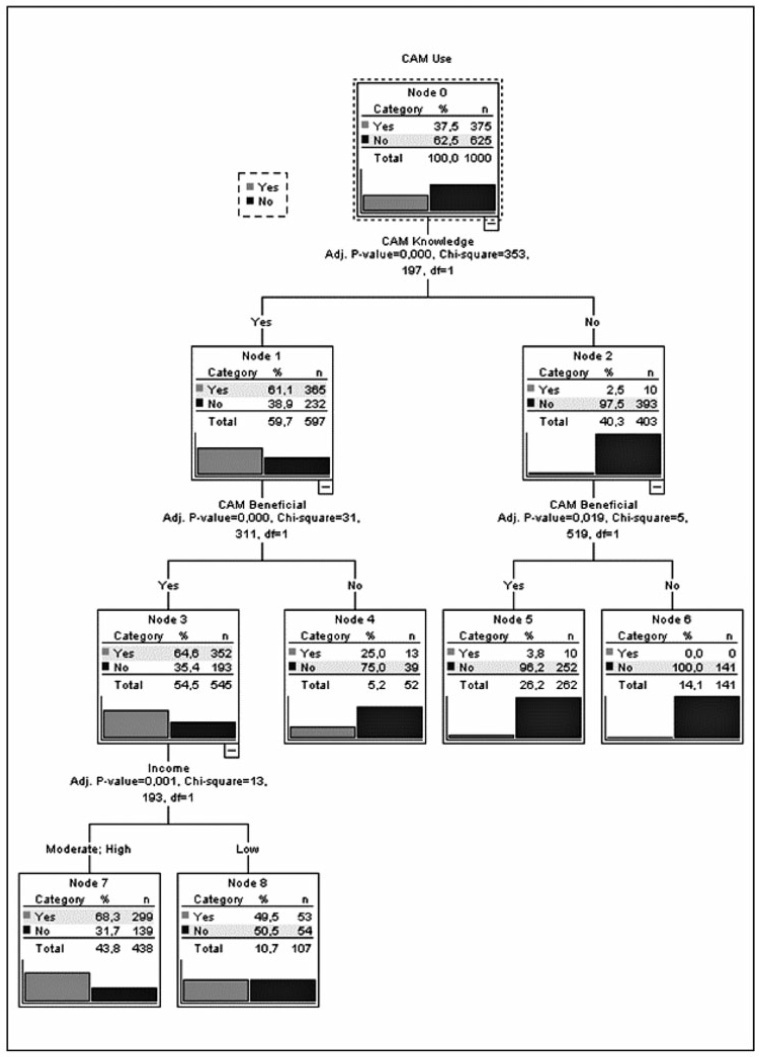Summary
Revista Brasileira de Ginecologia e Obstetrícia. 2024;46:e-rbgo17
00-00-2024
To determine the prevalence of anxiety, depression and burnout in residents of Gynecology and Obstetrics during COVID-19 pandemic in Brazil and its associated factors.
Cross-sectional study involving all regions of Brazil, through the application of a sociodemographic questionnaire, the Hospital Anxiety and Depression Scale (HAD) and the Maslach Burnout Inventory (MBI-HSS) instrument. Multivariate analysis was performed after adjusting the Poisson model.
Among the 719 participating medical residents, screening was positive for anxiety in 75.7% and for depression in 49.8% of cases. Burnout syndrome was evidenced in 41.3% of the physicians studied. Those with depression are more likely to have anxiety (OR 0.797; 95%CI 0.687 - 0.925) and burnout syndrome (OR 0.847 95%CI 0.74 - 0.97). Residents with anxiety (OR 0.805; 95%CI 0.699 - 0.928) and burnout (OR 0.841; 95%CI 0.734 - 0.963) are more likely to have depression.
High prevalence of anxiety, depression and burnout were found in residents of Gynecology and Obstetrics in Brazil, in addition to important correlations between anxiety-depression and depression-burnout.
Summary
Revista Brasileira de Ginecologia e Obstetrícia. 2023;45(7):377-383
09-08-2023
To analyze the impact of the COVID-19 pandemic on the residency of gynecology and obstetrics in São Paulo.
Cross-sectional study developed by representatives of residents of the Association of Gynecology and Obstetrics of the State of São Paulo (SOGESP, in the Portuguese acronym). Data were collected from questionnaires applied to gynecology and obstetrics residents registered on the SOGESP website in February 2022. The interviewees answered about the repercussions of the pandemic on medical residency and whether they had technical and psychological support during the period.
A total of 247 questionnaires were collected from residents of gynecology and obstetrics. The residents had an age of 28.3 ± 3 years old, and most of them were female (88.4%). The displacement to COVID care was reported by 62.34% of the students, but only 35.6% reported completely adequate personal protective equipment and only 7.7% reported complete theoretical and technical instruction to support these patients. Almost all of the interviewees stated that the gynecology sector was the most affected. The majority of the interviewees considered that the second-year residents had the greatest loss, and more than half of the residents in the 1st and 2nd year said they wished to give up their residency during the pandemic. More than 80% of the residents reported online theoretical classes and/or presentation of articles, reinforcing the fact that virtual activities gained a greater space within the medical residency.
The pandemic impacted the residency in greater proportion in outpatient clinics and gynecological surgeries, also interfering with the physician's desire to continue with the program.

Summary
Revista Brasileira de Ginecologia e Obstetrícia. 2022;44(6):621-628
08-15-2022
Breaking bad news is common in obstetrics and gynecology (ob-gyn). However, it is difficult, and few doctors receive training on how to deal with this situation. This narrative review aims to gather, analyze, and synthesize part of the knowledge on the area, focused on Ob-Gyn. Among the 16 selected articles, two are randomized controlled intervention studies, and most studies refer to obstetrics. The results found by us pointed out that simulation, feedback/debriefing, lectures, and protocols could improve doctors’ performance in communicating bad news. For patients, the context and how the information is transmitted seem to impact more than the content of the news. Ob-Gyn doctors could benefit from specific protocols and education, given the specialty’s particularities. There is a lack of evidence about the most effective way to conduct such training. Finding validated ways to quantify and classify studies’ results in the area, which would allow for the objective analysis of outcomes, is one of the biggest challenges concerning this topic.
Summary
Revista Brasileira de Ginecologia e Obstetrícia. 2021;43(11):853-861
01-12-2021
To evaluate the knowledge, attitudes, and behaviors regarding complementary and alternative medicine methods of patients who were admitted to gynecology outpatient clinics.
In the present survey, a questionnaire on complementary and alternative medicine practices was applied on 1,000 women (ages between 18 and 83 years old) who were admitted to the gynecology outpatient clinic of a tertiarymaternity hospital. Demographic features and knowledge, attitudes, and behaviors about these methods were inquired in face-to-face interviews.
While 80.7% of the total participants thought that complementary and alternative medicine was beneficial, only 37.5% of them had used these methods previously. The rate of prior knowledge on this subject was of 59.7% and the source of information was physicians for 8.5% of the patients. However, 72.4% of all participants wanted to obtain information on these methods and 93.7% wanted to be informed by physicians. In the decision tree model, having knowledge about complementary and alternative medicine was the most effective factor determining its use (p<0.001). Phytotherapy was found to be the most used method, with 91.4%. The most preferred plant was onion (18.9%), and the most common reasons for herbal use were stress (15.4%) and fatigue (15.2%).
More than one-third of the patients who applied to the gynecology outpatient clinics used one of the complementary and alternativemedicine methods at least once. As gynecologists and obstetricians, we need to be more knowledgeable about these methods to provide correct guidance to our patients for accessing accurate and effective information.

Summary
Revista Brasileira de Ginecologia e Obstetrícia. 2020;42(4):211-217
05-18-2020
To reveal the changes in the quality of life reported by women with Human papillomavirus (HPV)-induced lesions.
This is a cross-sectional, descriptive-exploratory study of a qualitative approach performed from June to August 2016. Semi-structured face-to-face interviews based on five questions on the concept of quality of life were used. The data were submitted to thematic analysis. All ethical aspects have been contemplated.
A total of 20 women aged between 25 and 59 years old were interviewed. From the analysis of the data, the following thematic units emerged: physical and emotional changes, especially complaints of pruritus, discharge and pain, worry, fear, shame and sadness; changes in sexual and affective relationships with decreased libido, dyspareunia and interruption of sexual activity; changes in social relationships resulting in absenteeism at work.
Human papillomavirus infection impairs the quality of life of women as it significantly affects sexual, affective, physical, emotional, and everyday habits. Therefore, HPV infection can lead to exponential changes in the quality of life of women, which can be mitigated by the availability of sources of support such as family, friends and the multi-professional team, helping to improve knowledge and cope with HPV.
Summary
Revista Brasileira de Ginecologia e Obstetrícia. 2019;41(10):613-620
11-07-2019
To evaluate the association between the acceptance on the part of the patients and their reasons to consent to or refuse medical student attendance during gynecological outpatient care, considering the participants’ demographic characteristics, consultation experience, and gender bias or lack thereof.
Face-to-face interviews with patients waiting for gynecological consultations that had been scheduled in advance at Hospital Universitário de Brasília. Contingency analyses were used to determine the levels of association among the patient variables. The accepted significance level was values of p<0.05.
We interviewed 469 patients. The comfort level with the presence of a student was strongly related to the number of students present during the consultation (Cramér V=0.671). The inclination to grant consent (a series of reasons to consent to or refuse student attendance) was significantly related (p<0.001) to the overall receptivity to student participation (ρ=0.482), the positive appraisal of student-doctor demeanor in previous consultations (ρ=0.253, N=408), and to greater levels of schooling (ρ=0.158). The patients’ receptivity was significantly related (p<0.001) to the lack of bias regarding the gender of the physician (CramérV=0.388), previous experience with students (Cramér V=0.235) and awareness of the fact that they would be present (Cramér V=0.217), older age (ρ=0.136, p=0.003), and multiparity (ρ=0.102, p=0.027).
Greater receptivity to student participation related significantly to five conditions in decreasing order of strength of association: lack of bias regarding the gender of the Ob-Gyn, previous experience with student involvement, awareness of the presence of students, older age, and multiparity. We also found that a more positive inclination to consent to student attendance correlated positively with a greater receptivity to student participation and to a suitable student-doctor demeanor.